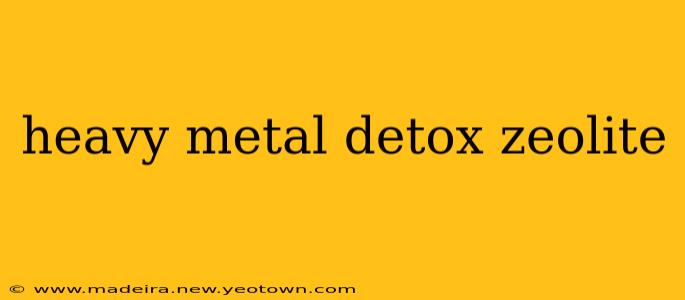The human body is a remarkable machine, but even the most robust systems can be burdened. Heavy metals, insidious invaders from environmental exposure and even certain foods, can accumulate in our tissues, potentially leading to a range of health problems. Enter zeolite, a mineral touted for its heavy metal detoxifying properties. But does it live up to the hype? Let's delve into the science and separate fact from fiction.
My name is Dr. Evelyn Reed, and for over 15 years, I've dedicated my career to researching the impact of environmental toxins on human health. While I'm not advocating for any specific treatment without consulting a medical professional, I'll share my knowledge to help you understand the potential of zeolite in heavy metal detoxification.
What is Zeolite?
Zeolite isn't some new-age miracle; it's a naturally occurring volcanic mineral with a unique crystalline structure. This structure is like a molecular sponge, capable of trapping positively charged ions, including certain heavy metals like lead, mercury, and cadmium. This is the basis for its purported detoxifying capabilities.
How Does Zeolite Work in Heavy Metal Detoxification?
Zeolite's mechanism is based on ion exchange. Imagine tiny cages within the zeolite crystal. These cages attract and bind to heavy metal ions, essentially trapping them. The zeolite then passes through the digestive system, carrying these trapped metals out of the body in stool.
Does Zeolite Actually Remove Heavy Metals?
This is a crucial question, and the answer is nuanced. While some studies suggest zeolite can bind to heavy metals in vitro (in a lab setting), the evidence of its effectiveness in vivo (in living organisms) is less conclusive. Human studies are limited, and more robust, large-scale research is needed to definitively confirm its efficacy in removing heavy metals from the human body.
What are the Different Types of Zeolite?
Several types of zeolite exist, each with slightly different properties. Clinoptilolite is the type most commonly used in purported detox products. However, it's crucial to note that not all zeolites are created equal; purity and particle size significantly impact their effectiveness and safety.
What are the Side Effects of Taking Zeolite?
While generally considered safe in low doses, zeolite can cause side effects like constipation, nausea, and vomiting. Furthermore, some forms of zeolite may contain harmful impurities. It's imperative to source zeolite from reputable suppliers who can guarantee purity and provide testing results.
Is Zeolite Safe for Long-Term Use?
The long-term effects of zeolite are not fully understood. While short-term use is generally considered safe for most people, prolonged use should only be undertaken under the guidance of a healthcare professional. Concerns exist about potential nutrient depletion, as zeolite can bind to essential minerals as well as heavy metals.
What are the Alternatives to Zeolite for Heavy Metal Detox?
Several other approaches exist for reducing heavy metal burden, including chelation therapy (a medically supervised procedure), dietary changes, and certain supplements. It's crucial to discuss these options with your doctor to determine the most suitable approach for your individual needs. Remember, self-treating heavy metal poisoning can be dangerous.
Can Zeolite Help with Specific Heavy Metals?
While zeolite shows promise in binding to certain heavy metals in laboratory settings, its effectiveness in targeting specific metals in the human body needs further study. This varies depending on factors like the specific zeolite type, dosage, and individual's health.
Conclusion:
Zeolite's potential as a heavy metal detoxifier is an area of ongoing research. While it exhibits promising properties in laboratory settings, human studies are limited. Always consult your healthcare provider before using zeolite or any other supplement, particularly if you suspect heavy metal toxicity. A holistic approach, incorporating dietary modifications, lifestyle changes, and possibly medically supervised chelation therapy, may be more effective and safer than relying on zeolite alone. Remember, your health is paramount, and informed decisions guided by medical professionals are crucial.

